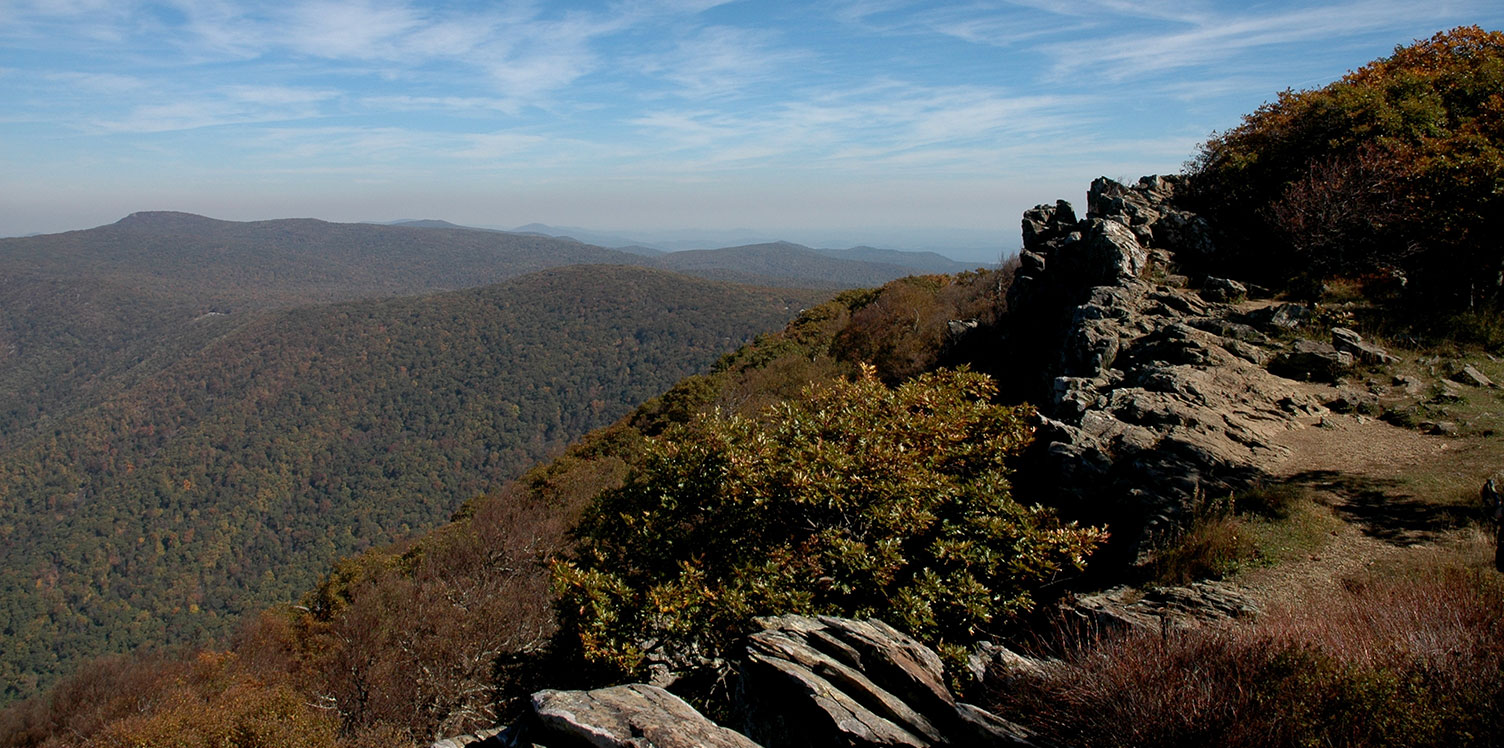
With seasonal changes upon us, now is the perfect time to hit the Appalachian trail in Virginia for a short day trip, or a longer backpacking trip. More of the Appalachian Trail passes through Virginia than any other states and the views can’t be beat. From pastoral scenes, to forest and farmland with creeks running through it, they are sure to make avid anglers and first-timers alike, very happy.
In Shenandoah National Park, you can cross the A.T. more than 30 times, never leaving your car and there are more than 1.2 million acres of forest lands and 1,000 miles of stream protected from development. With more than 70 mountain streams and 38 species of fish present, the Shenandoah National Park it a fantastic option for anglers. We’ve planned out the perfect weekend trip for you, follow our route to some of the best fishing streams and rivers along the trail. And while Virginia is home to or a destination for more than 800,000 anglers each year, you are likely to find your own private fishing hole along the route we have planned out for you.
Perhaps the most important thing you will need for a weekend of fantastic fishing in the Shenandoah is a fishing license. Required for everyone over the age 16 years of age, a one year license is $23. The non-resident fee is $36 and with both licenses, there is an available trout fishing license when fishing designated stocked trout waters and a $4 National Forest Stamp for fishing within the George Washington and Jefferson National Forests. There are also reciprocal agreements in place for certain waters with North Carolina and Maryland. The money from the fishing license stays within the state and within the Department of Wildlife Resources and goes to such things like trail maintenance, boat access, fisheries management, and many other popular outdoor recreational programs. In order to improve the angling experience and respond to anglers needs, the Department is also working to improve fish habitat, develop shoreline access, and build fishing piers that offer access for persons with disabilities. “Fortunately for Virginians, there’s a lake, river or stream within an hour’s drive from just about any location in the state, making it easy and economical to get away from it all for a day on the water, fishing, and relaxing.” said Bob Duncan, Executive Director of the Virginia Department of Wildlife Resources
A worthwhile investment for every member of your party, whether they are fishing or not, all Virginians benefit from the conservation and economic activity generated by anglers. Fishing alone is responsible for more than $1.3 billion in economic impact in the state. You can conveniently pick up your license online or in person at any licensed dealer.
Start your day early in the morning, driving about 40 minutes from Jollette, Virginia to the Hughes River. You can access some of the best spots on the 14 mile long Hughes via Skyline Drive, near the Shaver Hollow parking area near milepost 38. The best spots are about 1.8 miles down to the Nicholson Hollow Trail which runs along the stream. Hiking shoes and waders are essential to fishing this spot. Native brook, brown, and rainbow trout are plentiful and you will have good luck in the early morning hours at this popular spot. Bring your fly rod as imitations of terrestrial insects produce well in the summer months.
Considered one of the most beautiful hikes in the Shenandoah you won’t want to leave the Rose River off your itinerary. From Hughes River, drive approximately 40 miles to the Rose River trailhead, stopping in Syria for a late lunch. Park at Fishers Gap to access the top. Shortly after starting down the mountain on Rose River Fire Road, you will take the Rose River Loop Trail to the left about a half mile down the trail, take a blue-blazed trail to the right for 0.5 mile to the stream. You will find a cold, crystal clear freestone stream with an abundance of brook trout. Waders aren’t needed and you will find plenty of space for laying out a nice dry fly drift. After a full day of fishing, spend the night at the Graves Mountain Lodge near Syria.
Day 2 Morning: Staunton River
The fishing along the remote upper part of the Staunton River in can be a real challenge but worth the effort for those trout anglers looking for a stream off the beaten path. The Staunton River can be reached by following Route 662. Stop at the parking lot at the end of the road and follow Graves Mill Trail to the Staunton River Trail. A feeder to the Rapidan River, the Staunton is not as wide as its neighboring streams but has bountiful hatches that support an excellent population of feisty brook trout. This is a perfect rock hopping stream that offers pool after pool action. Some of the pools are fairly deep where the current is slow where a weighted nymph can produce good results.
Day 2 Afternoon: The Piney River
From Route 662, drive an hour north to the Piney River via US 29, stopping in Lynchburg for a late lunch and refreshments. The best option for stream accessibility is by parking at the Piney River Ranger Station south of Milepost 22. Hike down Range View Cabin Road to where Piney Branch Trail leads off to the left. This trail follows the stream to the bottom of the mountain. Make sure you reserve lots of time to fish this stream as the best parts of the Piney for fishing are about a 2 hour hike in. But you will be rewarded with abundant trout and beautiful scenery. During early spring and summer, check the water temperature as it will normally dictate the best fly selection to use for the day. If you choose to park elsewhere along the road, be mindful of the residents that live in this area. There are many nice areas along the stream to camp if you decide to extend your weekend for another day.
Whether you choose to follow our route for the day, the weekend, or longer, you are sure to find abundant fish, few people, and some of the best views in the south east.
Lee Walker is the Outreach Director for the Virginia Department of Wildlife Resources and an avid fly fisherman.


